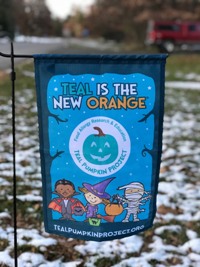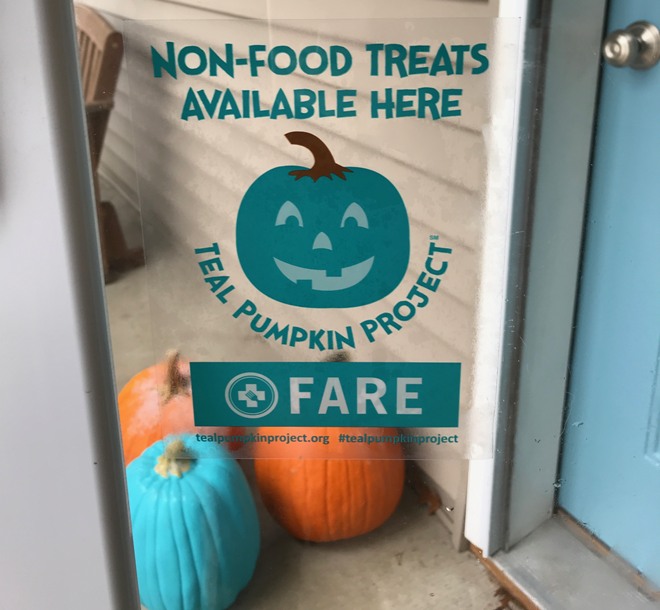
Photo Credit: by Sherry Dumpprope
Halloween can bring more tricks than treats for kids (and their families) who suffer from food allergies. In the United States alone, one in thirteen kids has a food allergy, and many of them can be severe, or even potentially life-threatening. The scary thing is, there isn’t even a leading culprit to make things easier for those trying to have allergen free candies at Halloween. Any food can cause a reaction. Ingredients such as nuts, milk, egg, soy, or wheat are in most candies and happen to be some of the most common food allergies. However, food dyes, preservatives, and other added ingredients can also trigger reactions. What’s a consciousness and responsible citizen meant to do?
Tip #1: Look for the Teal Pumpkins
Enter, the Teal Pumpkin Project.
I first learned of the project from a close family friend. Her daughter doesn’t have food allergies in the typical way, but they were trying to find the source of some of her daughter’s ADHD outbursts. As part of the Feingold diet, they were going dye free and preservative free as a family. When Halloween came, my friend knew she had to switch up her typical tradition. Honestly, I wish the Teal Pumpkin Project was around longer, as my brother had a severe allergy to all red food dyes and it would have helped our family out when I was younger.
The Teal Pumpkin Project is a food allergy awareness campaign that originated in Tennessee and has grown from there. Inspired by activity run by the Food Allergy Community of East Tennessee (FACET), the Food Allergy Research & Education (FARE) group took up the torch; launching a national campaign in 2014. The idea behind the project is to not only bring awareness, but also give ideas to those who would like to provide alternatives at Halloween to kids with allergies. Instead of offering candy, the Teal Pumpkin Project encourages handing out non-food treats as a safe and fun alternative.
This provides a much safer Halloween for kids with:
• Specific food allergies
• Food intolerances
• Eosinophilic Esophagitis (EoE)
• Celiac disease
• Food protein-induced enterocolitis syndrome (FPIES)
• Children with feeding tubes
• And kids on special diets (like my friend’s daughter)
And really, what kid doesn’t love getting fun toy-related items? Pretty much every kid I know loves glow sticks, stickers, bubbles, etc. I don’t know about you, but my kids receive WAY more candy than they can eat in a year, let alone the short time-span after Halloween. Getting non-food related Halloween items is a great way to keep down the number of dental visits, creeping obesity rates, as well as being safe for kids will food allergies.
To promote your participation with the Teal Pumpkin Project, you can get window stickers, print off signs, or simply paint a pumpkin teal and place it visibly on your front step. This way, families looking for a safe place to visit will be able to spot your house easily. You can even click on their interactive map, to see houses nearby who have marked themselves as active participants.
For those of you who might be wondering why the color teal… Turns out, teal has been used as the awareness color of food allergies for nearly 20 years.

Photo Credit: by Sherry Dumpprope
To learn more about the Teal Pumpkin Project or ways you can get involved, visit FARE’s website: tealpumpkinproject.org or check out their Facebook page: https://www.facebook.com/tealpumpkinproject/
Additional Tips for Keeping Halloween Safe for Kids with Food Allergies
If you’re a family with children who suffer from food allergies, here are a few additional tips to keep your kids safe this Halloween:
1.Talk to your neighbors
Now that you know about the Teal Pumpkin Project, why not share the news with your neighbors? You can share with them your story of your little one’s specific allergies, and give them an alternative they may never had heard of otherwise.
2.Inform teachers
Some schools have Halloween parties, or allow fun swaps of candy and treats this time of year. Speak up and be sure your child’s teacher is aware of the food allergies your kid has. You could even bring up the Teal Pumpkin Project with them. The more awareness, the better!
3.Halloween candy checks and swaps
Once you’ve talked with neighbors and teachers—the big day is bound to arrive. Rather than getting uptight about what your child is getting at the time of trick-or-treating, let them have their fun. Most kids are so wrapped up in the thrill of going house to house, they’re not worrying about inventorying everything landing in their bag. Instill at a young age a “required candy check” before anything in their bag is removed by them. Not only can you check for allergies, but look it over for other potential hazards as well. This check time will allow you, as the parent, to remove any allergy culprits and replace them with safer alternatives you know can be tolerated, or other non-food related goodies they’ll love.
4.Donate the culprits
Once your candy check is complete, you can always donate the candy to a local food shelf or other charitable organization, rather than throwing it away.
5.Change up the tradition
If avoiding food allergies is more hassle than it’s worth, why not change the tradition of trick-or-treating up all together? Host a Halloween Party, Halloween Scavenger Hunt, or simply enjoy a night in watching spooky movies in candle light? Get creative and think about what your family would enjoy most. I guarantee they won’t miss trick-or-treating at all.
Halloween is a fun time of year. Most of us have fond memories of our times dressed up and on the hunt for goodies to bring home. Hopefully, as awareness of childhood food allergies gains traction, we’ll see more people providing non-food related items so all kids can feel included. The Teal Pumpkin Project is a great place to start for making Halloween fun for everyone. We hope you have a safe, allergen-free Halloween!
###
Carissa Andrews is a freelance writer, graphic designer, and author. You can learn more about her at her website.